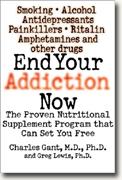Charles Gant, MD, PhD, & Greg Lewis, PhD
book reviews:
· general fiction
· chick lit/romance
· sci-fi/fantasy
· graphic novels
· nonfiction
· audio books
· author interviews
· children's books @
curledupkids.com
· DVD reviews @
curledupdvd.com
newsletter
win books
buy online
links
home
for authors
& publishers
for reviewers

 |
End Your Addiction Now: The Proven Nutritional Supplement Program That Can Set You Free Charles Gant, MD, PhD, & Greg Lewis, PhD Warner Books Hardcover 320 pages January 2002 |
|
End Your Addiction Now introduces the reader to essential biochemical processes in the body underlying various problems with and addictions to alcohol, heroin, cocaine, amphetamine, marijuana, tobacco, mind-altering prescription drugs (e.g., Paxil, Zoloft, Ritalin) and toxins. The book tells it like it is from the authors’ perspective in a frank, direct, and informational manner. They debunk the following myths still perpetuated by traditional medical treatment and recovery programs:
Groups of neurotransmitters (endorphins, enkephalins, serotonin, GABA, catecholamines) are key areas for identifying and overcoming substance-use problems. Problems that require a biochemical focus on prevention, treatment, nutrition, and professional services that, given greater acceptance and use, would exceed or, at least, complement positively the ineffective methods in use by traditional, drug treatment service-providers (e.g., doctors, therapists, AA). The book focuses on three stages of a Power Recovery program. The first stage is a Quick-Start where the client completes four questionnaires (one for each group of excitatory or inhibitory neurotransmitters) to pinpoint probable chemical imbalances. The participant discusses the test results with the doctor and obtains nutritional supplements to remedy chemical imbalances. The authors provide case studies with examples of each neurotransmitter imbalance, the rationale and method of correcting each imbalance, and the quantities of supplements, enzymes, and minerals to be taken and/or mercury, lead, copper, cadmium metals and free radicals to be reduced. The last stage of recovery represents a longer-term program wherein the participant has moved through milder degrees of withdrawal in the presence of a drug, has cut down or stopped abusing drugs, and has begun to heal and rebalance the chemical effects of past abuses. This stage includes the reduction of selected supplements and maintenance of others with supportive behavioral changes and/or return to a healthier lifestyle. Each drug problem presented has case models to demonstrate external symptoms which reflect internal biochemistry and related imbalances. In Chapter 14. the authors discuss exclusively the legal, but dangerous drug, Ritalin, which has been over-prescribed for male youngsters (age 6 to 17) for attention-deficit and hyperactivity disorders. Ritalin acts biochemically like cocaine and, over time, users can become addicted and seriously ill. Ritalin use by boys whose brains are still growing can intensify underlying causes by providing pseudo-stimulating replacement forms of dopamine which temporarily mask symptoms, but does not increase natural levels of dopamine needed to correct brain deficiencies and imbalances. Even though there have been numerous warnings about Ritalin over the years, according to the authors, today more than 10 percent of American schoolboys take this legalized-form of cocaine. The senior author concluded that he has never treated a single case of ADD or ADHD in which the prescription of a powerful, mind altering drug like Ritalin was necessary for the elimination of symptoms! End Your Addiction Now does not try to scare anyone, create guilt trips, or force one to take any action. But, the authors do offer the responsible reader clinical successes with case studies and planned, targeted uses of supplements to correct biochemical imbalances related to addiction problems and recovery. This is a helpful, hopeful book with a short summary on brain functioning and neurotransmitters. It offers diagnostic questionnaires for determining potential imbalances with supplement recommendations, specific physical tests for confirmation and guidance, and suggested resources. After 20 years away from serving as a psychiatric clinician in drug-abuse programs, I was shocked to read how little systematic clinical attention has been given to biochemical causes of drug abuse and supplemental nutritional elements in traditional, drug treatment and recovery programs. You may wonder, too, and ask why. © 2005 by David L. Johnson, Ph.D. for curledup.com. |
|
|
|
 Click here to learn more about this month's sponsor! |
|
| fiction · sf/f · comic books · nonfiction · audio newsletter · free book contest · buy books online review index · links · · authors & publishers reviewers |
|
| site by ELBO Computing Resources, Inc. | |
 The authors also slam HMOs and health-insurance companies for not allowing doctors the independence, time, and support to cover the use of biochemical test indicators of vitamin/mineral deficiencies and toxic reasons for patients’ drug abuse and a cascading array of biochemical health problems.
The authors also slam HMOs and health-insurance companies for not allowing doctors the independence, time, and support to cover the use of biochemical test indicators of vitamin/mineral deficiencies and toxic reasons for patients’ drug abuse and a cascading array of biochemical health problems.